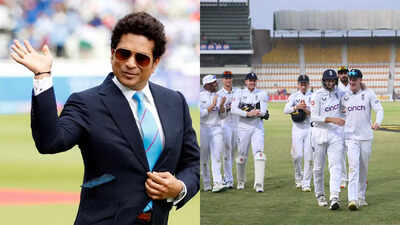England 358 (Smith 111, Brook 56, Asitha 4-102) and 205 for 5 (Root 62*) beat Sri Lanka 236 (Dhananjaya 74, Rathnayake 72) and 326 (Kamindu 113, Chandimal 79) by five wickets
The victory made it four out of four in the 2024 summer to date, following July’s 3-0 win over West Indies, but as had sometimes been the case in that series, England were not allowed to dictate terms with the authority that they might have envisaged at the halfway stage of the match.
And when a bowling display led once again by Asitha Fernando and Prabath Jayasuriya picked off each of the top three inside the first 16 overs of the chase, it required England to swallow their Bazball pride to chisel a path to victory at an unusually sedate rate of 3.58 an over.
Sedate, that is, until Smith got into his stride. Though fresh from his maiden century in the first innings, when Smith strode out to replace Harry Brook with the chase still in the balance at 119 for 4, he found himself pitched into a pressure situation unlike anything he’d yet surmounted in his short career.
Smith’s defensive technique soon proved up to the challenge as he crept along to six from his first 26 balls, in which period England went 14.4 overs, spread across a full hour, between boundaries: an uncommonly fallow passage of play for this regime. But then, after cracking back-to-back boundaries through the leg-side off Jayasuriya, the shackles were off. A subsequent six bounced off down an access tunnel and onto the concourse, and he added two further hooks for four off Vishwa Fernando to send Sri Lanka’s pressure scattering, before Asitha castled him with a superb inswinger for 39 from 48.
By then, England needed just 22 to win, and with the evening light holding up well despite the torrential rain that had dogged much of the rest of the country, Root and Chris Woakes did the needful shortly after 7.15pm, with Root notching the 96th half-century of his career before blazing the winning boundary over long-on… though not before attempting to seal the deal with a miscued scoop into his grille – a final flourish that proved the team’s prescribed ethos may have been dormant on this occasion, but it won’t be kept down indefinitely.
England’s target may have been surprisingly stiff, but they would have been chasing significantly more had it not been for a disciplined docking of Sri Lanka’s tail by England’s seamers, armed with the second new ball, shortly after lunch. In losing their final four wickets in the space of 26 balls, including the last three for five in ten, Sri Lanka’s innings ended much as it had begun (on first day and third), but up until that point, their seventh-wicket stand had all but turned the contest completely on its head.
Between Kamindu, who recorded his third hundred in the space of four Tests, and Chandimal, who was last man out for 79 despite having retired hurt on the third afternoon, Sri Lanka transformed their match prospects, and with scarcely a moment of alarm across their 30-over alliance.
Having let a promising position slip with the ball on the third morning, Sri Lanka’s focus was unwavering as the pair resumed on 204 for 6, with a slender lead of 82. They had more than doubled that advantage before Gus Atkinson prised out Kamindu for 113 shortly after lunch, to create an opening that Woakes and Matthew Potts were primed to pile through.
That set the tone for a proactive half-hour, with Chandimal following his partner’s lead as he built on his overnight 20 not out. The fact that he was there at all was remarkable, given the gruesome blow to the thumb that Wood had inflicted on the third afternoon. He had retired hurt on 10, but after an X-ray had given him the all-clear, returned with no ill-effects, although he did later relinquish the wicketkeeping duties, with Kusal Mendis taking over behind the stumps.
Pope rang the changes for England, but none of them had any answer to a burgeoning stand. Kamindu came into this contest with an average in excess of 100 after two centuries and an unbeaten 92 in his three previous Tests, and the range of his strokeplay was apparent in back-to-back boundaries off Atkinson, driven and pulled respectively, plus a ruthless eye for anything loose from the spin of Bashir.
Neither a 30-minute rain delay in the second hour of the morning, nor a brief sighting of the new ball before the interval could disrupt Kamindu’s focus, as he rushed through to his third Test hundred with a decisive slash through deep third off Woakes, to send England into lunch with a real battle on their hands.
Their immediate prospects after the resumption didn’t look much better. Kamindu surged onto the offensive after the break with a trio of off-side boundaries as Atkinson struggled with his line, but after an intervention from Pope, he switched to round the wicket with instant success. Kamindu fenced at the new angle, shaping into his left-handed stance, and Root at first slip held on a sharp low chance.
Atkinson was immediately yanked from the attack, with Potts adding his second of the innings courtesy of a juggled take from Brook at second slip, who parried Jayasuriya’s punch off the back foot, but recovered well to snaffle the rebound. Potts celebrated with a pat of his fluttering heart, having watched two key chances go down during his excellent but under-rewarded spell on day three.
Woakes added his third when Vishwa Fernando played down the wrong line to be struck in front of middle and leg, and though Chandimal attempted to cut loose with only Asitha for company, the substitute fielder Harry Singh stayed cool at deep cover to end a superbly gutsy innings.
England’s reply so nearly got off to a disastrous start when, on 2, Ben Duckett jabbed his third delivery down the leg-side, to be brilliantly caught by Kusal in his outstretched right glove. However, in an echo of Duckett’s reprieve against Mitchell Starc in last year’s Ashes, the decision was overturned because Kusal’s palm was pushing the ball into the ground as he completed the catch.
Asitha was the unlucky bowler, but he made amends in superb fashion in his third over, flipping the shiny side of his swinging new ball to graze a more regulation edge through to Kusal, as Duckett played for the inswinger that had done him in in the first innings.
Dan Lawrence, by this stage, had launched Jayasuriya for a wonderfully clean straight six, but in his unfamiliar role as opener, his frailties outside off were consistently probed, not least by Asitha, whose command of seam and swing once again made him the pick of Sri Lanka’s attack.
It was Jayasuriya who made the next breakthrough, however, as Pope – familiarly skittish at the start of his innings – climbed into a reverse-sweep on a deliberate leg-stump line, but managed only to toe-end a simple chance to Dhananjaya de Silva at slip for his second score of 6 in the match. And when Lawrence, on 34, was pinned lbw by a nip-backer soon afterwards, England had slipped to a dangerous scoreline of 70 for 3.
Root’s and Brook’s response was to bed in for an old-school rebuilding job, adding 49 for the fourth wicket at a rate of less than 3.4 an over – a reflection both of Sri Lanka’s disciplined attack, but also of the relative lack of depth in England’s batting in the absence of Ben Stokes.
Jayasuriya maintained his restrictive line from over the wicket, frequently tempting Brook to sweep his way through a packed field behind square, and England could have been four-down before lunch had the substitute fielder Ramesh Mendis clung on his outstretched right hand at backward square, when Brook had just 4 to his name.
However, it was Jayasuriya’s reversion to round the wicket that prised the next opening. On 32, Brook failed to account for the drift back into his stumps, and chipped a toe-ended drive back to the bowler, whose catch was upheld despite Root’s initial belief that the ball had again been grounded – a stance that earned him a hard stare from Kusal as the replay flashed up on the big screen.
With 86 more needed, then, out came Smith. His selection ahead of Ben Foakes had been largely a consequence of Foakes’ perceived limitations as an attacking batter, particularly when marshalling the tail. But here was the polar opposite challenge: an onus on defence, to provide a trusty sidekick to England’s most admirable and obdurate matchwinner.
Smith duly proved worthy of the task, and more. But it was Root – his senior status all the more towering in Stokes’ absence – who was England’s main man in the final analysis.
Andrew Miller is UK editor of ESPNcricinfo. @miller_cricket







